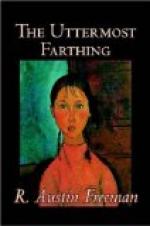“Having settled on the method, I was disposed to put it into practice at once; but then another consideration arose. My wife would have to be buried. By some hands she must be laid in her last resting-place, and those hands could be none other than my own. So I must stay behind for a little while.
“The hours passed on unreckoned until pencils of cold blue daylight began to stream in through the chinks of the shutters and contend with the warm gaslight within. Then another footstep was heard on the stairs and the cook, Wilson, came into the room. She, like the housemaid, stopped dead when she saw my wife’s corpse, and stood for an instant staring wildly with her mouth wide open. But only for an instant. The next she was flying out of the front door, rousing the street with her screams.
“The advent of the cook roused me. I knew that the police would arrive soon and I instinctively looked about me to see how this unspeakable thing had happened. I had already noticed that one of my wife’s hands—the one that I had not been holding—was clenched, and I now observed that it grasped a little tuft of hair. I drew out a portion of the tuft and looked at it. It was coarse hair, about three inches long and a dull gray in color. I laid it on the clean note-paper in the drawer of the bureau bookcase to examine later, and then glanced around the room. The origin of the tragedy was obvious. The household plate had been taken out of the plate chest in the pantry and laid out on the end of the dining table. There the things stood, their polished surfaces sullied by the greasy finger-marks of the wretch who had murdered my wife. At those tell-tale marks I looked with new and growing interest. Finger-prints, in those days, had not yet been recognized by the public or the police as effective means of identification. But they were well known to scientific men and I had given the subject some attention myself. And the sight of those signs-manual of iniquity had an immediate effect on me; they converted the unknown perpetrator of this horror from a mere abstraction of disaster into a real, living person. With a sudden flush of hate and loathing, I realized that this wretch was even now walking the streets or lurking in his accursed den; and I realized, too, that these marks were, perhaps, the only links that connected him with the foul deed that he had done.
“I looked over the plate quickly and selected a salver and a large, globular teapot, on both of which the prints were very distinct. These I placed in a drawer of the bureau, and, turning the key, dropped it into the pocket of my pajamas. And at that moment the bell rang violently.
“I went to the door and admitted a police constable and the cook. The latter looked at me with evident fear and horror and the constable said, somewhat sternly:
“‘This young woman tells me there’s something wrong here, sir.’
“I led him into the dining-room—the cook remained at the door, peering in with an ashen face—and showed him my wife’s corpse. He took off his helmet and asked rather gruffly how it happened. I gave him a brief account of the catastrophe, on which he made no comment except to remark that the inspector would be here presently.




